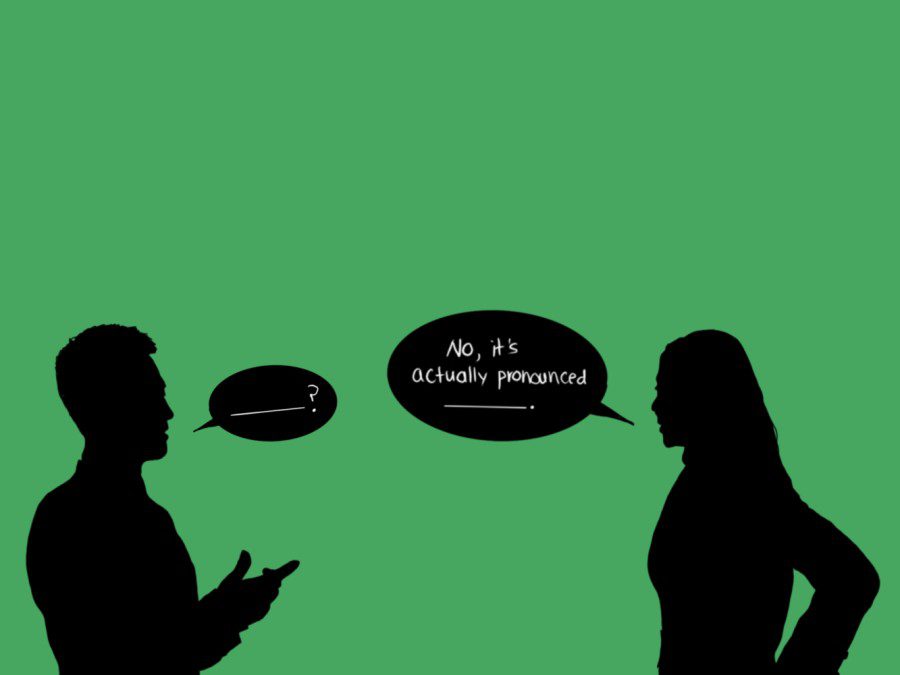Opinion: Stop stopping people from trying hard to pronounce our names right.
Sure, it’s embarrassing for both of us when you pronounce our names wrong, but it’s still important that you keep trying.
Intimidation or fear should not stop you from trying to pronounce our names right. (Illustration by Aaliya Luthra)
October 15, 2022
This op-ed was written in response to “Stop trying so hard to pronounce our names right” (Oct. 5).
As an international student, you’ve moved to a place that’s foreign to you — a place whose cultures and norms you may or may not understand. In the case of moving to a Western country, you can be somewhat confident that they won’t understand your culture or norms.
You don’t have many friends in the city yet, and you’re looking forward to meeting your roommate.
“I’m Zack, what’s your name?” he says. “Prithvi,” I reply. “Privthee?” Though somewhat embarrassed, I correct him. He tries again. “Prithee?” he asks. Okay, this is awkward. I correct him once more, making sure to properly enunciate each individual syllable. “Prithvi,” he says. Finally, success.
His name is “normal.” His name is bog-standard, regular, vanilla. Your name, on the other hand, is “exotic.” Your name is “hard to pronounce because you don’t have the same sounds in English as they do in your home country.”
Names, first and last, are typically the first piece of identifying information that we exchange with one another. They’re an important part of identity, both cultural and personal — almost integral to functioning in society. Driver’s licenses, passports, and a plethora of other items we use every single day would be entirely worthless if we didn’t have names.
Using somebody’s name is a sign of respect. This isn’t just the case for people with “exotic” names. Michael may prefer being called “Mike” or “Mickey,” or just Michael.
I, Prithvi, may prefer to be called by the name that my parents gave me over some abbreviation or nickname that makes life more convenient for people who are unfamiliar with its pronunciation. That’s not to say that you can’t give your friends nicknames, but that hinges on a certain familiarity that’s developed as a result of time and trust.
Calling somebody you don’t know by a nickname is akin to calling them some other name entirely. The name Mike holds the same significance to someone whose name is Robert as it does to a Michael who doesn’t use that shorthand in reference to themself.
In a conversation with an advisor regarding my resumé, I was told to “de-emphasize” my name because people in the United States with “more ethnic-sounding names” are typically less likely to get jobs. This is an idea that’s been vouched for by several studies, which consider not only the United States, but other occidental countries as well. In fact, numerous studies have indicated that your name has a profound impact on the course of your life, and even your mental health.
I encourage you to take a moment and consider how it feels to have an “unconventional” name that could negatively affect your prospects of being employed.
While we fight for the change necessary to make such bias a thing of the past, I — and I’m sure many others — would greatly appreciate it if you’d continue doing your best to make sure you’re giving people the respect they deserve and putting in the effort to pronounce names properly.
NYU is an inclusive community of diverse viewpoints, backgrounds and experiences. Taking somebody’s feedback, irrespective of whether it’s about a topic typically perceived as small — such as the pronunciation of their name — can go a long way toward making them feel heard and appreciated. Correctly pronouncing a person’s name can be the first step to fostering a healthy, peaceful environment that is conducive to learning and socializing alike.
When done by a large group of people, small actions can snowball into large-scale societal change. It doesn’t matter whether it’s adding your pronouns to social media, your name pronunciation to NYU Albert, familiarizing yourself with the International Phonetic Alphabet, or asking somebody if you’re pronouncing their name correctly.
We, as the NYU community, can strive to use those first interactions as the beginning of new relationships instead of an experience that’s embarrassing for both parties.
WSN’s Opinion section strives to publish ideas worth discussing. The views presented in the Opinion section are solely the views of the writer.
Contact Prithvi Rajaram Subrahmanyam at [email protected].
























































































































































